How craftsman Henk carved out a career in Sheffield
and live on Freeview channel 276
Now aged 63, the Sheffield-based craftsman works from a timber yard in Birley Carr and his pieces can sell for up to £7,000.
Sounds like the perfect place to be for a lover of all things wood.
Advertisement
Hide AdAdvertisement
Hide AdBut his journey here was an adventure not for the faint-hearted and certainly anything but ordinary.
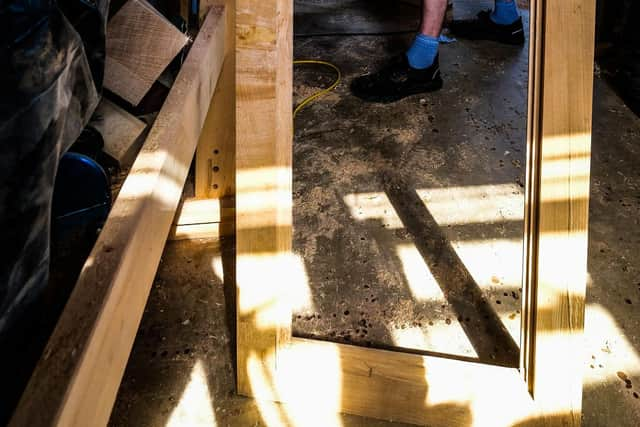

Henk was born in Kano, Northern Nigeria, after his dad David moved there to help the country’s bid for independence.
David was a master carpenter and his skills were in demand by the British Executive Service Overseas, set up by business people to give something back to developing countries.
“Dad met mum who was an air hostess in Lagos and I came along,” he says.
Advertisement
Hide AdAdvertisement
Hide AdDavid died three years ago and it was then Henk discovered his dad had been awarded a gold medal for his efforts.
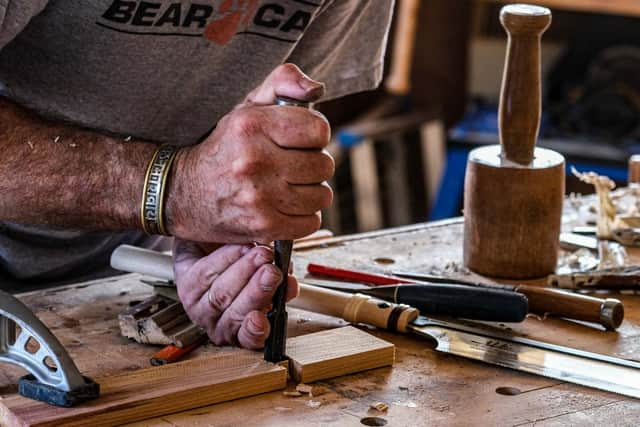

The family moved back to England when Henk was seven. His dad had a house in Matlock so the young Littlewood went to school at All Saints and what was Ernest Bailey Grammar School, now known as Highfield.
The contrast between Matlock and Nigeria was stark.
“The first question I was asked was why are you not black? I didn’t have a clue about racism until I came here, but I was called all the names under the sun, including the N word. It took me a long to time to adjust.
“I hated school, the only thing I enjoyed was woodwork, the teacher at Erneset Bailey was an amazing fellow called Mr Poulson.
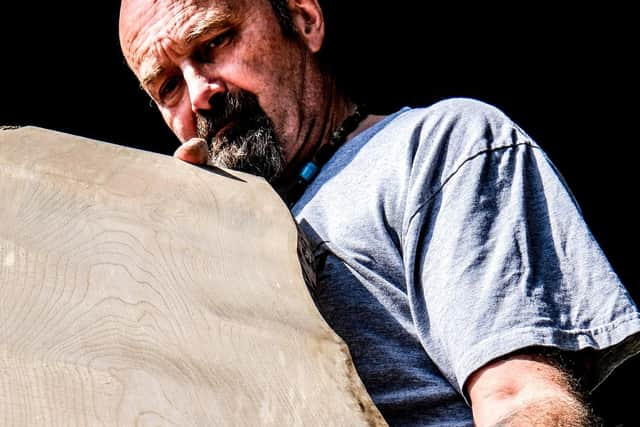

Advertisement
Hide AdAdvertisement
Hide Ad“He encouraged me to build on the woodwork I got from my dad and use it, be practical.
“Unfortunately, I was an academic, so I went to university to do a degree and PHd in Zoology.”
He says unfortunately because his real love was working with his hands but woodwork helped his studies.
“I did research for 10 years and wood informed it, in that it was about the form of things, the anatomy.
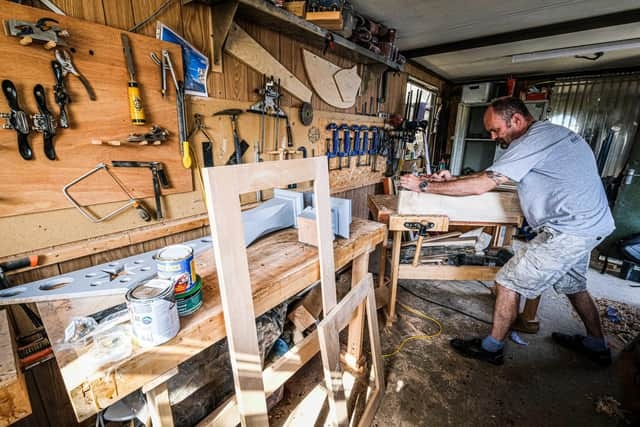

Advertisement
Hide AdAdvertisement
Hide Ad“In woodwork, you are talking about shapes and geometry, that’s the connection. Natural forms and natural things all inform what I do now.”
He is a published scientist with papers on centipede behaviour and centipede leg glands. “As obscure as you can get. I also worked on termites and pest control.”
Ironic when you consider termites attack wood, but at least he knew how to tackle it.
The academic life continued until his early 30s when it became obvious that having a young daughter meant Henk needed a steady job.
Advertisement
Hide AdAdvertisement
Hide AdHe retrained to teach Science and moved to Newcastle but it was not a happy time and ended in Henk having a nervous breakdown.
“Teaching and the stress of not doing what I wanted to do led to me ending up in hospital. I was advised I couldn’t teach anymore after being diagnosed with what was then called manic depression.”
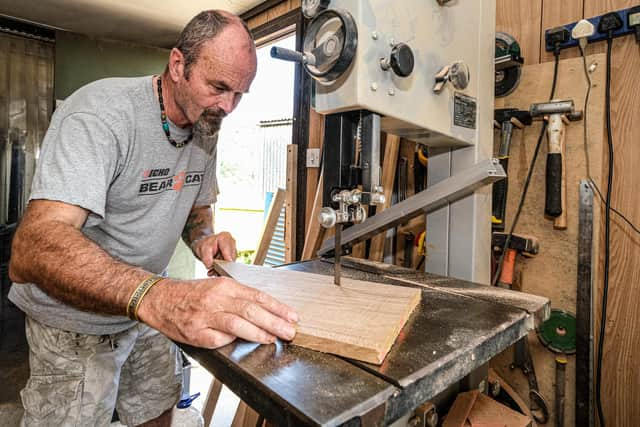

He was in his early 40s and the diagnosis, now called BiPolar disorder, needed help.
“I had created an enormous amount of anxiety and stress for all my family and friends around me over one mad summer and a lifetime of unknowing,” he says.
Advertisement
Hide AdAdvertisement
Hide Ad“I had lost the thread of my own narrative, my own tool box – the one between my ears – had been burgled by illness.
“If you're bright you think you know better than someone else, you don’t listen, you just plough on to the detriment of those around you.”
The family moved from Newcastle to Chesterfield and Henk had a brief dabble at teaching again but ended up back in hospital. “When I got some help I could relearn the discipline of how to listen,” he says.
“I liked the clever dick stuff but the thing that kept me happy and had the key for me to connect was making things.”
Advertisement
Hide AdAdvertisement
Hide AdHe went to see a counsellor and was asked what he now considers a fateful question - what did he like to do.
At first, Henk gave his stock answer of liking a challenge, but when asked again he decided to tell the truth. “I said I liked working outside and being with people. She asked me if I had thought about conservation.”
It was a significant moment and helped Henk change direction. He joined the British Trust for Conservation Volunteers which led him to Sheffield and a job with the Friends of the General Cemetery in Sharrow. Henk then applied to Sheffield Council’s ranger service and his Zoology background proved a perfect ally.
This carried on for 10 years until he was made redundant. Where to turn next?
Advertisement
Hide AdAdvertisement
Hide Ad“Eight years ago I decided it was time for my wife Clare to do what she wanted to. We sold the house and invested in her business.”
We’re talking about Tea With Percie, a tea shop on Abbeydale Road, still going strong despite the challenges of lockdown.
“I did the woodwork and fitting out. I was also looking for somewhere to do woodwork and was lucky to walk past Exchange Place.”
The city centre base is home to Yorkshire Artspace and Henk was invited in to look at the studios. He saw one he liked, was interviewed and got it.
Advertisement
Hide AdAdvertisement
Hide AdHis work also got noticed. One customer review says: “Henk draws inspiration from evolution and nature, and these themes are ever present in his work. The shapes and forms of his work make a perfect marriage with the texture and warmth of wood. If you're in the market for anything woody, be it a spoon, table or pagan wedding arch, then Henk is your fella. And a lovely fella he is too, as warm as the wood he works with.”
When I read this to him, he smiles. “That comes from my best customer,” he says. “The way I work with people I make things for is to have a proper conversation so I can get near to what they want.
“It is about bringing everything I know and feel into helping that process. It’s more like midwifery than artistry.”
Whatever it is, the same customer kept coming back. “When we stopped by Henk was carving an oak bookcase and he'd just taken delivery of an unwanted yew tree,” he reports.
Advertisement
Hide AdAdvertisement
Hide Ad“We just missed the seven story posts and bench he'd been commissioned to make for Chelsea Park, but we're planning a trip to see them.”
Having got a customer base, Henk moved from the city centre to Albion Timber in Birley Carr six years ago. “I wanted to be closer to the wood,” he says.
And he’s serious. “A lot of my customers are aware of environmental issues and I thought I can do something. I spoke to Albion Timber and they acquired a 30ft cabin that night which is where I am.”
Henk now lives in Park Hill and his business Woodenhenk offers everything from a garden gate in oak at £500 to a four poster bed at £3,500. His most expensive piece was a giant globe sculpture he calls Ruskin’s Mind.
Advertisement
Hide AdAdvertisement
Hide AdIt was commissioned by the Arts Council, is now in Warwickshire and cost £7,000.
That was before lockdown, which hit many businesses hard. Not Henk. “I found it a boon because there was a lot less emotional stimulation. From my point of view it went okay because it’s harder for me when there’s lots of stimulation.
“Professionally I was busy, people were wondering what to do with their homes and got in touch with me.”
He describes his work as carpentry with an edge. I always respect the material, it is not just a blank canvas, it notifies and informs the design. Things tend to be naturalistic, I use traditional techniques, that’s my dad’s influence.”
Advertisement
Hide AdAdvertisement
Hide AdHenk is now a grandfather to four-year-old Joseph, a good name for a carpenter, and says he will carry on working for as long as people want him. “Once they don’t I’ll camp out in my wife’s tea shop and eat cake!”
When I ask him what his favourite work is, we go to his favourite teacher, Mr Poulson. “It was the last piece I made under his tutelage. He was the sort of teacher who never gave an A, it was always A minus.
“We always did traditional joinery but he once let me do a sculpture and I did a dolphin in mahogany. I kept trying to get the fins thin enough and asking him what do you think? He said what do you think? This happened several times until the fin snapped off. I had gone too far.
“He said ‘Perhaps you’ll learn something from that,’ and the first thing was there’s no such thing as perfection. It was also about getting to the end point - sometimes you have to go wrong to get it right.”
Advertisement
Hide AdAdvertisement
Hide AdHe fixed the dolphin and won a school prize, enough money to buy books for his Zoology studies. He later learnt Mr Poulson had added to the prize money.
“I couldn’t thank him because he died before I had chance, but I thank him by doing woodwork.”